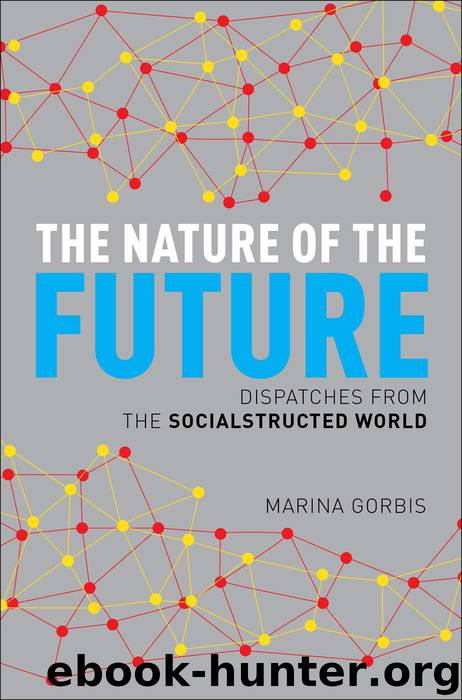The Nature of the Future: Dispatches from the Socialstructed World by Gorbis Marina

Author:Gorbis, Marina [Gorbis, Marina]
Language: eng
Format: epub
Publisher: Free Press
Published: 2013-04-09T07:00:00+00:00
A New Ecology of Science: From Small to Big Science and Back
In his famous lecture and later book titled The Two Cultures, the British scientist and novelist C. P. Snow lamented the growing gap between the intellectuals (mostly literary intellectuals) and the scientists. Between the two, he saw a “gulf of mutual incomprehension—sometimes (particularly among the young), hostility and dislike, but most of all lack of understanding.”1 Interestingly, the gap Snow lamented was a gap between two elites, two otherwise very similar groups, “comparable in intelligence, identical in race, not grossly different in social origin, earning about the same incomes, who had almost ceased to communicate at all.”2
As important as the gap between the two elites may have been, the larger gap that Snow (and most other observers until recently) did not consider is the one between average people and scientists. In fact we have become used to treating science as a priestly profession open to a few highly degreed experts, a world of its own, accessible only to those with the right credentials. Yet developmental psychologists such as Alison Gopnik at UC Berkeley argue that all human beings possess an innate “explanatory drive,” motivating us to actively test hypotheses concerning causal relations in the natural world. In this sense, we are all scientists by nature. Gopnik argues that this explanatory drive is “like our drive for food or sex. When we’re presented with a puzzle, a mystery, a hint of a pattern, something that doesn’t quite make sense, we work until we find a solution.”3 We feel pleasure at the “Aha!” or “Eureka!” moments, when we’re satisfied that we have solved some cognitively irksome problem. Explanatory instinct is particularly evident in babies as they discover the rules of the world around them and test theories of how things work.
Testing hypotheses, trying out different solutions, and discovering patterns are a natural part of who we are. We have done this for centuries, in caves, in fields, in alchemists’ labs, kitchens, and garages. In fact one of the most impactful scientific inventions of our time, the long-lasting electric lightbulb, was the creation of a school dropout without any formal degree whose elementary school teacher thought the hyperactive youngster’s brain was addled. Thomas Edison held many jobs before the age of thirty, from selling newspapers to being a telegraph operator, but he worked his whole life to satisfy the explanatory drive. He was the ultimate tinkerer, one of the most prolific inventors in history, holding 1,093 patents in the United States as well as many in the United Kingdom, France, and Germany.4
Early in his life, Edison conducted research in self-built labs and developed a hearty dislike for the obtuse language of much of science. (He thought the aristocratic terms in which Newton wrote his theories were unnecessarily confusing to the average person.) Then, ironically, he created the first industrial research lab in Menlo Park, New Jersey, the opening of which in 1876 heralded the beginning of “big science.”5 For a hundred years
Download
This site does not store any files on its server. We only index and link to content provided by other sites. Please contact the content providers to delete copyright contents if any and email us, we'll remove relevant links or contents immediately.
| Blogging & Blogs | eBay |
| E-Commerce | Hacking |
| Online Searching | Podcasts & Webcasts |
| Search Engine Optimization | Social Media |
| Social Media for Business | Web Browsers |
| Web Marketing |
Secrets of the JavaScript Ninja by John Resig Bear Bibeault(19793)
Kotlin in Action by Dmitry Jemerov(18834)
Grails in Action by Glen Smith Peter Ledbrook(16448)
Sass and Compass in Action by Wynn Netherland Nathan Weizenbaum Chris Eppstein Brandon Mathis(14047)
WordPress Plugin Development Cookbook by Yannick Lefebvre(4404)
Ember.js in Action by Joachim Haagen Skeie(3985)
Mastering Azure Security by Mustafa Toroman and Tom Janetscheck(3528)
Learning React: Functional Web Development with React and Redux by Banks Alex & Porcello Eve(3177)
A Blueprint for Production-Ready Web Applications: Leverage industry best practices to create complete web apps with Python, TypeScript, and AWS by Dr. Philip Jones(3120)
The Innovators: How a Group of Hackers, Geniuses, and Geeks Created the Digital Revolution by Walter Isaacson(3107)
Mastering Bitcoin: Programming the Open Blockchain by Andreas M. Antonopoulos(3029)
The Art Of Deception by Kevin Mitnick(2782)
Drugs Unlimited by Mike Power(2580)
Hands-On Cybersecurity with Blockchain by Rajneesh Gupta(2455)
Kali Linux - An Ethical Hacker's Cookbook: End-to-end penetration testing solutions by Sharma Himanshu(2376)
Writing for the Web: Creating Compelling Web Content Using Words, Pictures and Sound (Eva Spring's Library) by Lynda Felder(2336)
SEO 2018: Learn search engine optimization with smart internet marketing strategies by Adam Clarke(2251)
JavaScript by Example by S Dani Akash(2217)
DarkMarket by Misha Glenny(2200)
